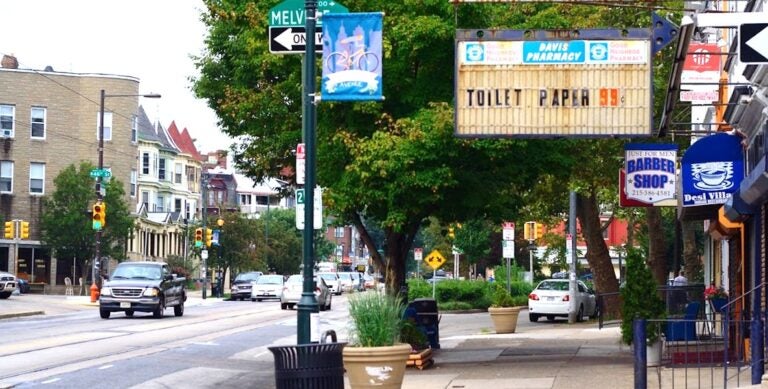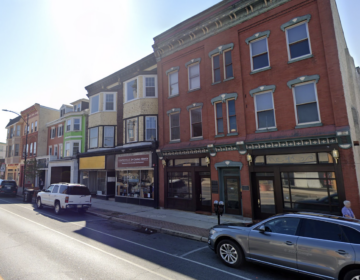2020 is killing small businesses. Philly won’t recover if we let them die
There are things the city can do to support struggling small businesses — and keep Philadelphia from falling deeper into poverty.

Small businesses line Baltimore Avenue in West Philadelphia. (The Sustainable Business Network of Greater Philadelphia)
Small businesses are the cornerstone of our economy.
Before COVID-19, they employed nearly half of all Pennsylvania workers and represented 97% of all Philadelphia businesses. Traditionally, they have led economic recovery, accounting for 67% of net new jobs following the Great Recession. On average, independent businesses return 300% more money per dollar of sales to their local economy than their chain competitors. Additionally, research consistently shows that cities with thriving independent business communities are strongly linked to higher incomes, less economic inequality, stronger community cohesion and wellbeing, and improved environmental sustainability.
Recent reports from Pew and Center City District add to this body of knowledge.
They both found that U.S. cities with higher rates of small businesses per capita and higher business ownership rates among historically marginalized groups have lower poverty rates. It should be no surprise then that Philadelphia — a city known for its persistent 26% poverty rate and a difficult place to be an independent business — has one of the lowest rates of small businesses, especially those owned by people of color.
Despite the economic crisis caused by COVID-19 that is disproportionately impacting Black and brown people, and despite the loudest call for racial equity since the Civil Rights era, the city cut already insufficient resources for local businesses. For example, the core budget of Philadelphia’s Commerce Department was slashed by 63%, leaving only $3.6 million in core funding — of a total City budget of $4.8 billion — to serve the city’s estimated 26,000 small businesses. On its face, this choice — and the lack of transparency and public discourse about it -— should concern all of us, as should what it implies about the city’s strategy for economic stabilization and recovery.
A significant portion of the city’s revenue comes from business-related taxes (wage tax, net profits tax, sales tax, business income and receipts tax, aka BIRT, etc.). The disproportionate amount of the overall business tax burden on small businesses is notable. For example, Pew’s report shows that between 2015 and 2017, Philadelphia’s largest businesses contributed 98% of total reported business receipts, yet only contributed half of overall business taxes.
The city’s FY21 budget has passed, and the Commerce Department’s budget is already cut. However, there are still many things that can and should be done despite limited financial resources to create a supportive economic ecosystem for local independent businesses throughout Philadelphia.
A temporary moratorium on commercial evictions; an equitable tax structure; commercial rental protections; improved zoning codes; accessible resources to current and emerging businesses owned by people from historically marginalized backgrounds; improved processes, procedures, and customer service for business owners interfacing with the city; and meaningful incentives for socially and environmentally responsible businesses are a few good places to start.
COVID-19 has impacted our local businesses community — and all those they employ — in ways many people don’t fully comprehend. However, the city’s revenue won’t recover if small businesses don’t recover, and Philadelphia won’t thrive if our local businesses aren’t thriving. So, let’s take this moment now to rebuild our local economy for the better. Because wouldn’t it be great if Philadelphia was known for having the most robust and diverse local business community, the least economic disparity, and the lowest poverty rate of all major cities in the country?
Anna Shipp is the Executive Director of the Sustainable Business Network of Greater Philadelphia.

Subscribe to PlanPhilly
WHYY is your source for fact-based, in-depth journalism and information. As a nonprofit organization, we rely on financial support from readers like you. Please give today.





![CoronavirusPandemic_1024x512[1]](https://whyy.org/wp-content/uploads/2020/03/CoronavirusPandemic_1024x5121-300x150.jpg)


